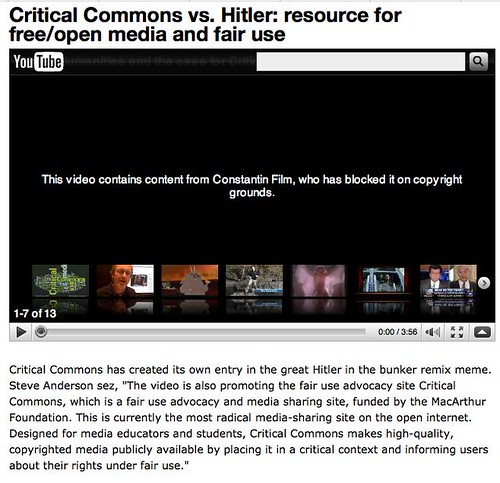I was heartened by the emergence of Critical Commons, a site and service dedicated to combating the fear, uncertainty, and doubt around fair use and copyright. Critical Commons also provides “an online tool for viewing, tagging, sharing, annotating and curating media within the guidelines established by a given community… to build open, informed communities around media-based teaching, learning and creativity, both inside and outside of formal educational environments.”
They even did a funny take on the Hitler ‘Downfall’ meme, thereby asserting that this sort of remixing is protected both as fair use and as parody.
Alas, due to a copyright claim, huge swathes of Downfall remixes are being deleted en masse from YouTube via the company’s automated ContentID system. (More on this system here.) That includes the Critical Commons video — see the screenshot at the top of this post.
Reminders of a similar episode in which a video where Creative Commons founder Lawrence Lessig demonstrated fair use was also taken down…
There’s yet another Hitler Downfall video that explains the issues better than I can. Watch it while you can.
Obviously if this sort of mistreatment can happen to informed and prominent advocates such as Critical Commons and Lawrence Lessig when they are exercising legal rights, the scope of permitted expression for the rest of us is even more constrained.
And consider this episode in comparison with my last post. Whose interests and values are being promoted and protected by the law as it stands? And who gets screwed?
On a related note, Apple continues to promote its proprietary interests by refusing to allow Flash development and the Scratch app. They ban apps by Pulitzer Prize winning satirists. (I highly recommend Jared Stein’s excellent post on Apple and the open web.)
Now, YouTube and Apple have every right to make decisions in terms of maximizing their profits. But a key distinction is made by Tom Hoffman. We might tolerate this behavior as consumers, but surely as educators (especially those of us who receive public money), we should expect a higher standard?
At the very least, these actions should have us questioning whether Google, Apple, and countless other companies who act the same way can ever be trustworthy partners. It’s clear that academic values will never match up against corporate profits and synergistic alliances for these companies. Their priorities speak clearly for themselves, we will always be secondary markets at best — especially since educators seem uninterested in defending and asserting their values. Not when there are shiny new toys to play with.
Educational technologists talk a big game about the deep transformative effects of digital media. If this is indeed the case, then the control and ownership of digital environments should not be a trivial afterthought.



This to me seems an integral (if not predominant) part of the discourse around edufuture every one is currently discussing. It seems like when you start talking about corporate control, open standards, and some space relatively free of comemricalization everyone brands you as a radical or some kind of crackpot. And that is cultural, we have gone so far to the right with our tolerance for being raped by media corporations and paying top dollar for access to information and entertainment that it seems that those who question some of the bases of that position are necessarily just being negative or recklessly destructive of a certain practive in instructional technology.
A student, Victoria Pacher, in my #ds106 course had a nice little graphic about the future of net neutrailty and the corporate division of the open web viz-a-viz service providers, and at first it might seem a bit crazy:
From this post: http://victoriapacher.info/blog/?p=401
But in many ways this is exactly how my cable bill works. We are watching the internet be transformed into cable before our very eyes, and the Downfall video is a perfect example of this. I’ve seen more tweets and posts about the fact, and nothing about the matter.
It is a depressing vision of the future I see right now, I hope Treme proves that wrong, cause The Wire didn’t.
Here is the image I was trying to embed above:
http://i.imgur.com/YZeFm.jpg
Looks like Google is at least acknowledging this issue:
http://googlepublicpolicy.blogspot.com/2010/04/content-id-and-fair-use.html
But as the commentor on that post notes, they have it ass backwards. Namely, “Rights holders are the only ones in a position to know what is and is not an authorized use of their content, and we require them to enforce their policies in a manner that complies with the law.”
If rights holders are the only one who know, than fair use is basically meaningless. Or am I missing something
Thanks for that last link Jim… I’m still trying to figure it out, but somehow I’m less than reassured.
As for your first comment, I don’t see why asserting longstanding legal rights should be thought of as radical either. Seems like the kind of thing that a real liberal, or a real conservative would stand up for…
And everybody seems to love Larry (Lessig), but the silence amongst educators around that episode honestly puzzles me. I’ll try to hold off on harsh judgment… I must be missing something as well.
Thanks, Brian, for your supportive words about Critical Commons. We are currently weighing various options regarding the Downfall detournement, which was one of our few efforts at publicizing the site. What’s surprising is that Critical Commons itself has never received a single DMCA notice after nearly a year online and with several hundred clips and commentaries available to the public.